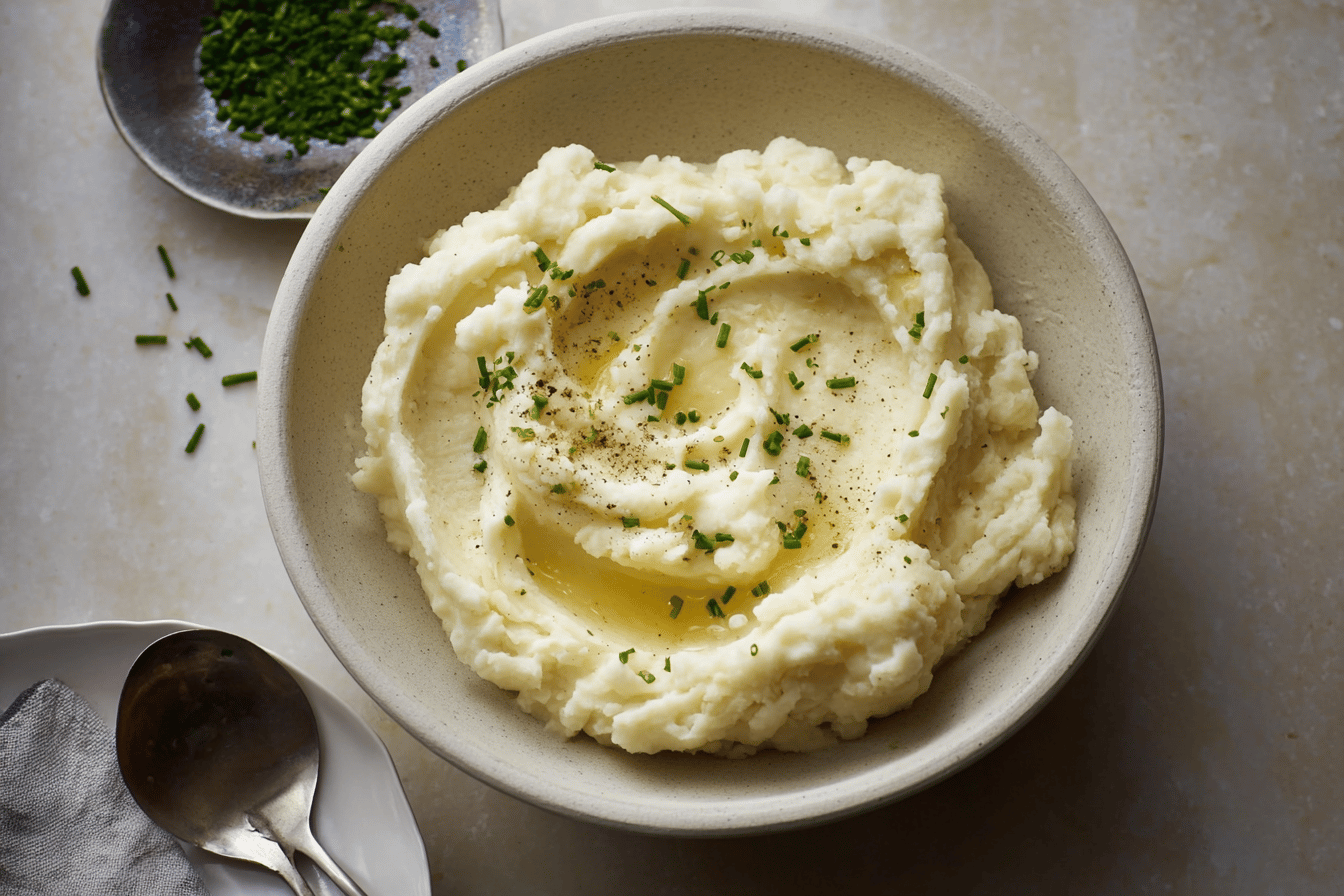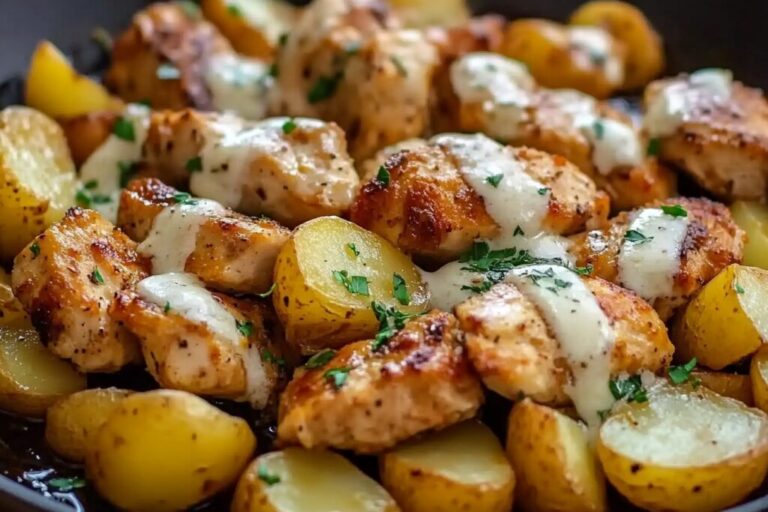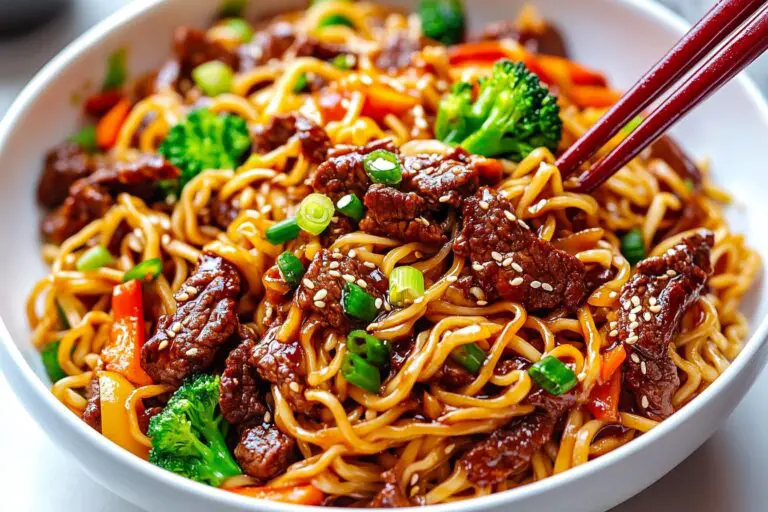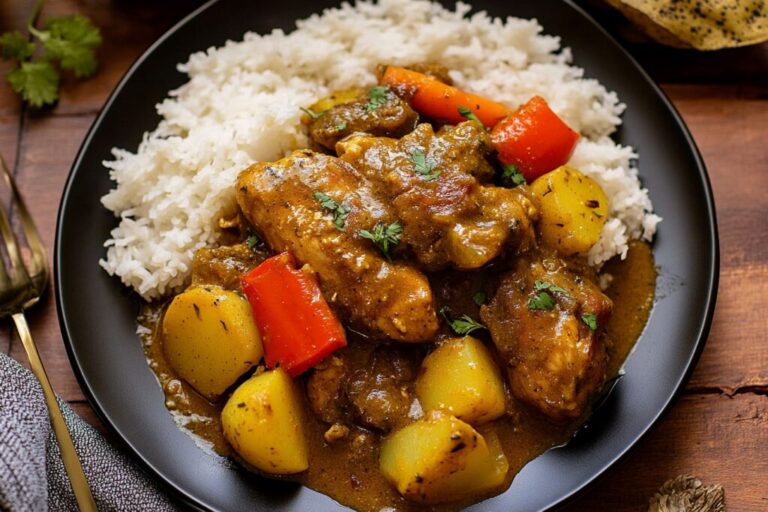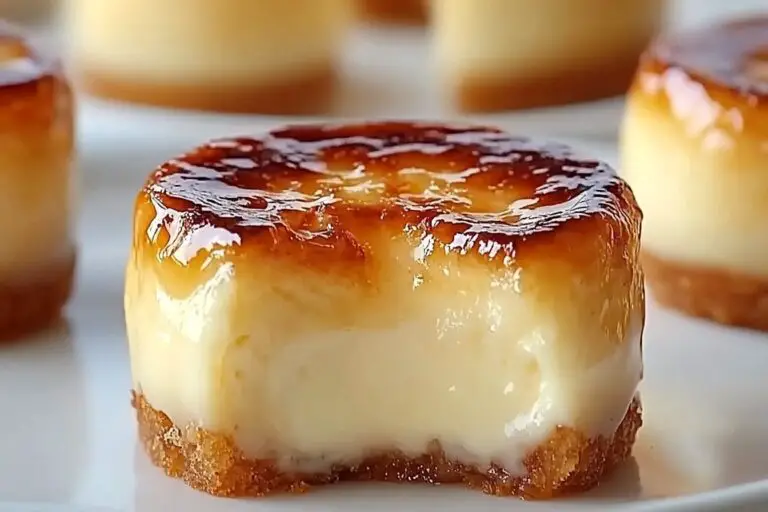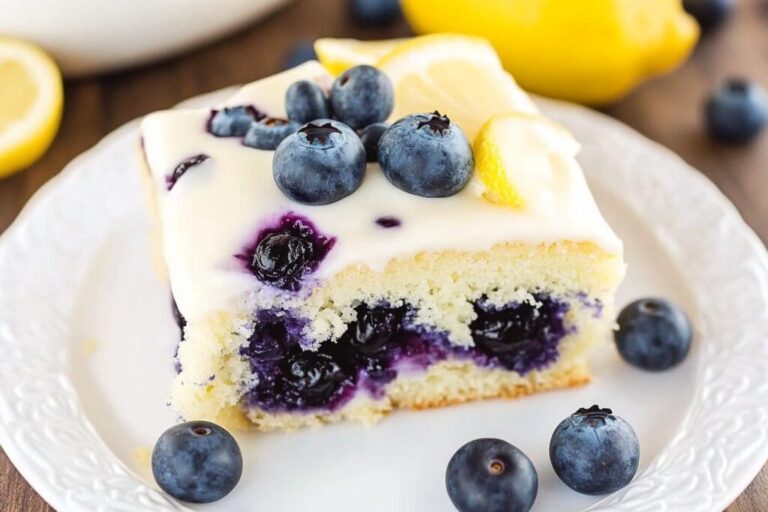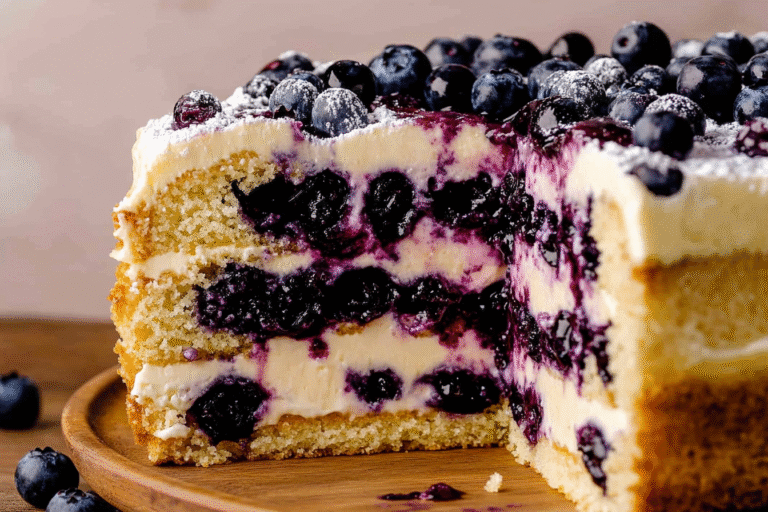Simple Creamy Mashed Potatoes
Introduction
Discover a delicious comfort food
Mashed potatoes are a beloved side dish that pairs perfectly with nearly any meal. This simple creamy mashed potatoes recipe is an effortless way to achieve fluffy, buttery, and indulgent results. Whether you’re hosting a family dinner or looking to enhance a holiday table, this recipe will surely impress.
Detailed Ingredients with measures
A straightforward list for the perfect mash
– 2 pounds of Yukon Gold potatoes
– 1/2 cup unsalted butter, softened
– 1/2 cup milk or heavy cream, warmed
– 1/4 cup sour cream
– Salt to taste
– Pepper to taste
Prep Time
A quick start to a cozy dish
This recipe requires only 15 minutes of prep time, making it an ideal choice for a simple yet satisfying culinary addition to your meal.
Cook Time, Total Time, Yield
Details for planning your cooking schedule
The cook time for these delicious mashed potatoes is approximately 25 minutes. When combined with the prep time, the total comes to just around 40 minutes. This recipe yields 4-6 servings, offering enough creamy goodness for a family or for leftovers to enjoy later.
Finish with a delightful flourish
Once complete, your mashed potatoes will have an irresistibly creamy and smooth texture. Serve them immediately as a side dish to a hearty main course, and enjoy how this timeless recipe brings warmth and flavor to every bite.
“`html
Detailed Directions and Instructions
Prepare the Potatoes
1. Peel the potatoes and cut them into evenly sized chunks. This helps to ensure they cook evenly.
2. Place the potatoes in a large pot and cover them with cold water. Add a generous pinch of salt to the water.
Cook the Potatoes
1. Bring the pot to a boil over medium-high heat. Once boiling, reduce the heat slightly to maintain a gentle boil.
2. Cook the potatoes until they are fork-tender, approximately 15-20 minutes. Check by piercing a potato chunk with a fork; it should slide in and out easily.
3. Drain the potatoes in a colander and let them sit for a minute or two to release excess steam. This helps prevent watery mashed potatoes.
Mash the Potatoes
1. Return the drained potatoes to the pot or a large mixing bowl.
2. Using a potato masher or ricer, mash the potatoes until smooth. For extra creamy texture, consider using a ricer.
Add the Dairy
1. Gradually add softened butter to the potatoes, mixing after each addition until incorporated.
2. Slowly pour in warm milk, a little at a time, stirring gently to combine. Stop when the potatoes reach your desired creaminess.
3. Season the mash with salt and pepper to taste, mixing gently to ensure even seasoning.
Serve
1. Transfer the mashed potatoes to a serving dish and garnish with optional additions such as herbs or additional butter if desired.
2. Serve immediately while warm.
Notes
On Choosing Potatoes
For best results, use high-starch potatoes like Russets or Yukon Golds. These varieties yield fluffier and creamier mashed potatoes.
On the Dairy
Ensure the butter is softened, and the milk is warmed before mixing. Cold ingredients can cool down the potatoes and make mixing more difficult.
For Extra Flavor
Consider adding roasted garlic, cream cheese, or grated Parmesan for an enhanced flavor profile.
Storing and Reheating
Leftover mashed potatoes can be stored in an airtight container in the refrigerator for up to 3 days. Reheat gently on the stovetop or in the microwave, adding a splash of milk if necessary to bring back creaminess.
Make-Ahead Tip
Mashed potatoes can be prepared a few hours in advance and kept warm in a slow cooker on a low heat setting. Stir occasionally to maintain texture and consistency.
“`
Cook techniques
Boil the potatoes correctly
Cut the potatoes evenly to ensure consistent cooking. Make sure to start with cold water to prevent uneven cooking. Salt the water lightly to season the potatoes from the inside as they cook.
Use the right type of potatoes
Choose Yukon Gold or Russet potatoes for the best creamy texture. These types are starchy and make for a smooth, fluffy mash.
Warm the milk and butter
Warm up the milk and butter before incorporating them into the potatoes. Adding them cold may cool down the potatoes and affect the texture and flavor.
Drain completely
After boiling the potatoes, ensure that they are completely drained to prevent watery mashed potatoes. Let the potatoes sit in the pot for a minute or two to remove excess moisture.
Use the right mashing tool
Use a potato masher for a rustic texture or a ricer for ultra-creamy potatoes. Avoid using a food processor as it can make the potatoes gluey.
Season adequately
Season your mashed potatoes with salt and pepper to taste. Adding seasoning in layers during the mashing process ensures even flavor distribution.
Customize to taste
Incorporate garlic, herbs, or cheese if desired, for added flavor. These additions can elevate the dish to suit your preferences.
FAQ
Can I use a different type of potato?
While Yukon Gold and Russet potatoes are ideal, you can experiment with other types. However, note that waxy potatoes may not yield the same creamy texture.
How do I avoid lumps in my mashed potatoes?
Ensure the potatoes are thoroughly cooked and mash them while they are still hot. Using a ricer can also help eliminate lumps for a smooth consistency.
Can I make mashed potatoes ahead of time?
Yes, mashed potatoes can be made ahead of time and reheated. Store them in an airtight container and reheat gently over the stovetop or in the microwave, stirring occasionally.
What can I add for more flavor?
You can add roasted garlic, fresh herbs, cream cheese, sour cream, or grated Parmesan for added richness and flavor.
How can I make my mashed potatoes healthier?
Substitute whole milk with a lower-fat option or use chicken or vegetable broth. Reduce the butter or replace it with olive oil for a lighter version.
Can I freeze mashed potatoes?
Yes, mashed potatoes freeze well. Place them in an airtight container or freezer-safe bag, and reheat over low heat while stirring in some milk or butter to restore the texture.
Why are my mashed potatoes gluey?
Over-mixing the potatoes or using a food processor can break down the starches and make them gluey. Mix gently and avoid overworking.
How long should I boil potatoes for mashing?
Boil the potatoes for about 15-20 minutes or until they are fork-tender. Cooking time may vary depending on the size of the potato pieces.
What should I do if my mashed potatoes are too thick?
If your mashed potatoes are too thick, add a splash of warm milk or cream, and mix gently until the desired consistency is achieved.
Can I use plant-based milk and butter?
Yes, plant-based milk and butter can be used for a dairy-free version of mashed potatoes. Opt for unsweetened varieties to maintain the savory flavor.
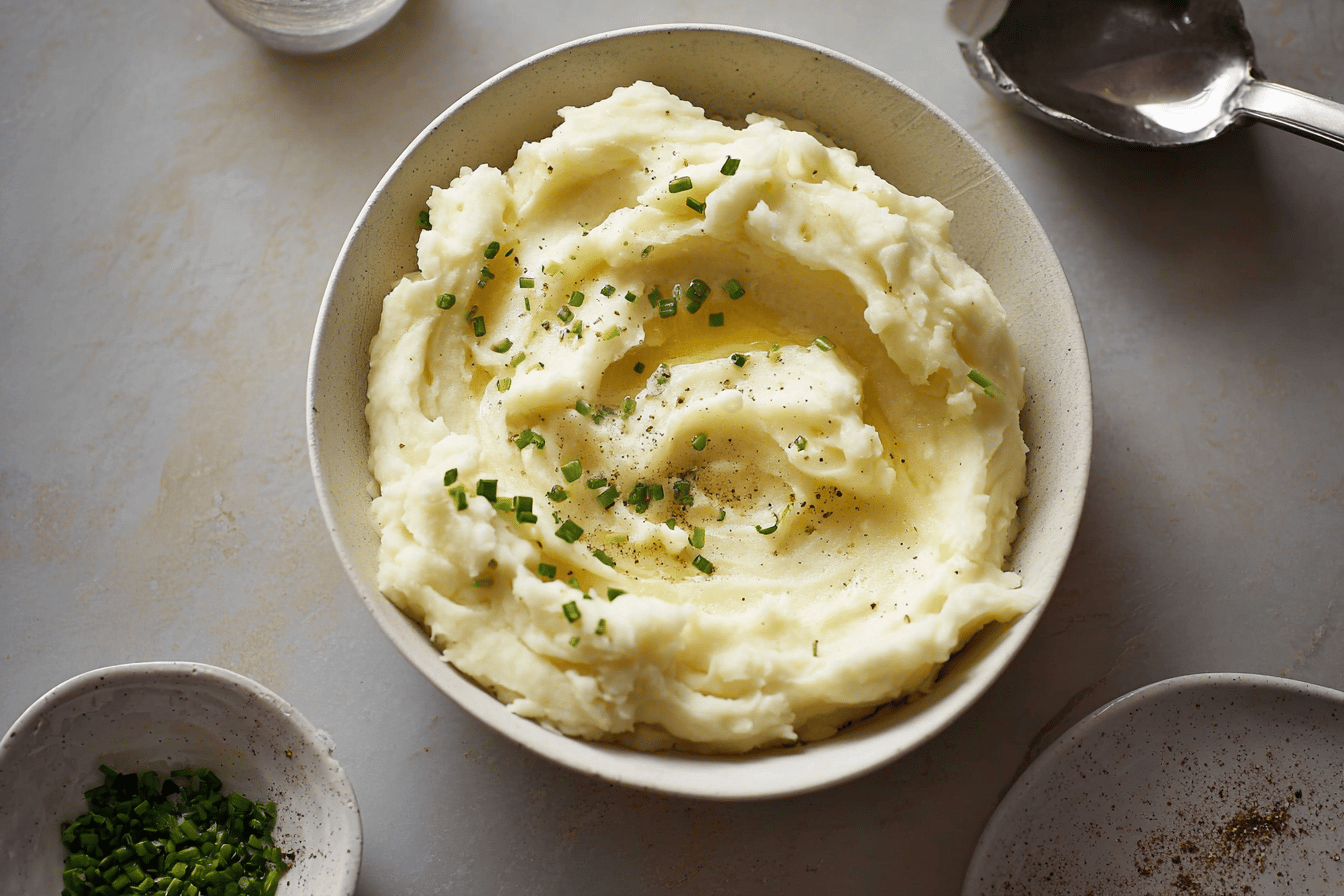
Conclusion
Simple Creamy Mashed Potatoes are a timeless comfort food that is both versatile and exceptionally satisfying. Their smooth, buttery consistency makes them the perfect accompaniment to countless dishes, and they’re sure to be a crowd-pleaser at any meal. With just a handful of ingredients and a straightforward process, you can create an irresistible side dish that brings warmth and indulgence to every serving.
More recipes suggestions and combination
Garlic Herb Mashed Potatoes
Add roasted garlic and fresh herbs like thyme or parsley for a savory twist on the classic creamy mashed potatoes.
Loaded Mashed Potato Bake
Top the mashed potatoes with shredded cheese, crumbled bacon, and scallions before baking for a comforting loaded potato dish.
Mashed Sweet Potato Blend
Combine mashed sweet potatoes with the creamy mashed potatoes for a subtly sweet and vibrant mix.
Mashed Potatoes with Gravy
Pair the mashed potatoes with a rich and flavorful homemade gravy, perfect for holiday meals and hearty dinners.
Cheddar and Chive Mashed Potatoes
Stir in sharp cheddar cheese and freshly chopped chives for a zesty and cheesy side dish.

